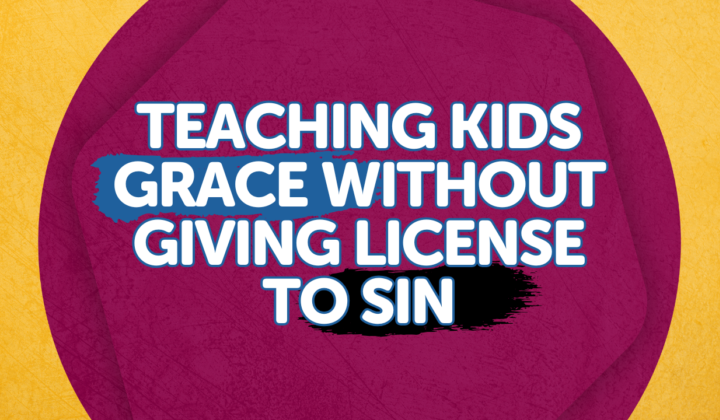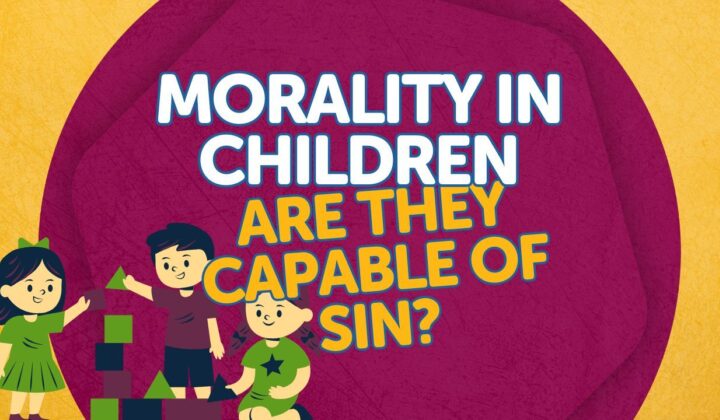Learn more about the journey that led to us equipping kids to carefully evaluate every idea they encounter.
Meet members of our team who have contributed to curriculum development.
Hear from real users of the Foundation Curriculum.
Learn what we believe about God, Jesus, Scripture, and more.
How to Disciple Kids Through Their Sin Struggles
Today's podcast question says:
"My daughter has a selfish personality. Even though we have often focused on loving others, she has a tendency to internalize critiques, questioning why God made her this way. I struggle to teach her how to find happiness amidst her selfishness when she doesn't feel it."
This is a really interesting question to think through. Even if your child doesn’t struggle with selfishness in this exact way, every child will wrestle with their own specific sin struggles. As humans, we are all fallen, and each of us has what I like to call "signature sins"—the particular temptations we gravitate toward because of our unique personalities.
So today, we’re going to explore how we can meet our children where they are in their struggles, disciple them well, and encourage their growth in Christlikeness.
A Quick Note on My Experience
Before diving in, I want to acknowledge something: I am not a parent. I don’t have children of my own. However, my experience comes from years of working with kids in the classroom, my extended family, and my church community. I’ve had the privilege of discipling many children and watching them grow, and that experience has given me insight into how to wisely walk alongside kids in their spiritual development.
That said, parenting is a unique calling, and you are the primary disciple-maker in your child’s life. My goal is to help equip you with tools so that you can disciple your child faithfully and biblically.
Discerning Responsibility in Discipleship
When we think through our children's sin struggles, we need to ask ourselves three key questions:
- What part of this is my responsibility?
- What part of this is my child's responsibility?
- What part of this can only God do?
Ultimately, God is sovereign over all things. But as parents, we have a God-given responsibility in discipling our children. At the same time, our children must take ownership of their responses to sin, and only God can truly transform their hearts.
1. What Is My Responsibility?
As parents, our responsibility is to disciple our children in three key areas:
- The heart – shaping their affections and relationships
- The hands – training their daily habits and routines
- The head – guiding their thought patterns and worldview
So how does this apply to the mother who wrote in about her daughter's selfish tendencies?
Discipling the Heart
A crucial part of discipleship is maintaining a strong relationship with your child. We are not called to be our children's friends, but we are called to love them, guide them, and enjoy them. Strengthening your bond with your child will open doors for deeper discipleship.
When you notice your daughter being self-focused, speak truth to her gently but clearly:
“I know that you’re struggling right now. I know that you're questioning why God made you this way, but we can trust what Scripture says in Psalm 139—that God knit you together in the womb and made no mistakes. Right now, though, you are choosing to focus on yourself, and we need to take steps to redirect that focus.”
This won’t always be met with gratitude. When our sin is pointed out, our natural reaction is often defensiveness. But lovingly helping our children recognize their sin is one of the most important things we can do for them.
Discipling the Hands
Part of discipleship involves establishing healthy habits and routines that counteract sinful tendencies.
For a child struggling with selfishness, incorporate acts of service into your daily or weekly rhythms. This might look like:
- Making a meal for a neighbor
- Writing an encouraging note to a friend
- Helping a younger sibling with schoolwork
Growing up, my mom helped me battle my own struggle with selfishness by redirecting my focus. When I was feeling down on myself, she would ask:
“Who can you encourage right now? Who might be struggling that you're overlooking because you're focused on yourself?”
This simple question helped shift my perspective and train me in the habit of thinking outwardly rather than inwardly.
Discipling the Head
Our children's thought patterns are shaped by the ideas they regularly encounter. One of the best ways to train their minds is by immersing them in God’s Word.
Memorizing Scripture together is an excellent way to renew their thinking. Here are a few passages to focus on:
- Philippians 2:3-4 – "Do nothing from selfish ambition or conceit, but in humility count others more significant than yourselves."
- Romans 12:2 – "Do not be conformed to this world, but be transformed by the renewal of your mind."
Another way to shape their thinking is by teaching them how to evaluate ideas critically and biblically.
If you haven’t yet, I highly recommend checking out our Studying the Bible Curriculum. This curriculum is designed to help kids (and parents!) understand the structure of Scripture and how to correctly interpret different genres—including wisdom literature like Proverbs.
2. What Is My Child’s Responsibility?
While you can guide and instruct your child, true repentance is her responsibility. She must choose to:
- Repent of her sin – Recognizing and turning away from selfishness
- Take her eyes off herself – Redirecting her focus outward
- Follow the guidance you give her – Choosing to trust and obey
You can encourage her and provide opportunities for growth, but ultimately, she must make the choice to walk in obedience.
3. What Can Only God Do?
Finally, we must acknowledge that only God can truly transform her heart. You cannot force spiritual growth. Only the Holy Spirit can convict, change desires, and produce lasting fruit.
Because this is God’s work, prayer is essential. Pray that:
- God would soften her heart
- She would desire to obey Him
- The Holy Spirit would sanctify her and make her more like Jesus
Final Thoughts & How to Submit a Question
If you found this episode helpful, I’d love for you to like and subscribe so you don’t miss future episodes. Also, if you have a question you’d like me to answer, you can submit it at FoundationWorldview.com/podcast.
We literally could not do this podcast without your questions, so thank you to everyone who has taken the time to submit one!
And as always, my prayer for you is that no matter the situation in which you and the children God has placed in your care find yourselves, you would trust that He is working all things together for your good by using all things to conform you more into the image of His Son.
I’ll see you next time.
Related Posts and insights

Teaching Kids Grace Without Giving License to Sin
In this episode, Elizabeth Urbanowicz dives into a powerful question: How can parents teach kids about God's grace without inadvertently allowing a permissive view on sin? Using biblical examples and principles from the New Testament, she guides parents on teaching the concepts of grace, repentance, and right living in a way that nurtures both understanding and respect for God’s truth. Tune in to learn practical tips on instilling both right beliefs and actions within your family.

Understanding Morality in Children: Are They Capable of Sin?
Do children have a sense of morality? Are they capable of sin before a certain age? And how does this impact how we disciple and evangelize them?

Talking To Kids About Their Sin Nature without Damaging Their Self-Esteem
In this episode of the Foundation Worldview podcast, host Elizabeth Urbanowicz answers a question that many Christian parents may have: how do we teach young children about their value and worth to God while also discussing the concept of sin?



